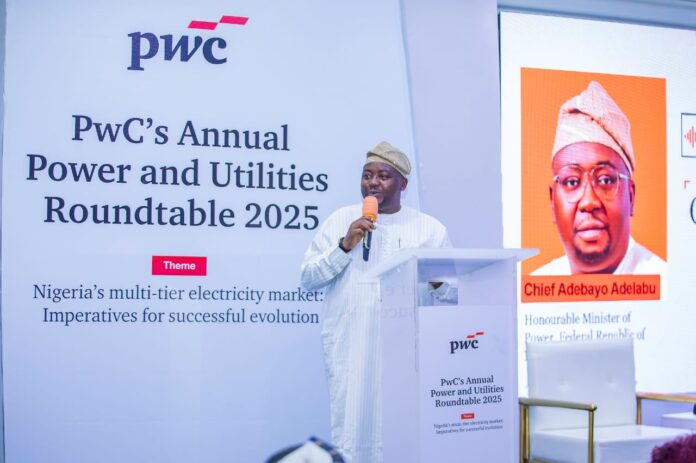Minister of Power, Adebayo Adelabu, has said that the Federal Government’s strategic interventions in the power sector were already yielding significant results, culminating in a landmark synchronisation of the Nigerian grid with the wider West African network and attracting over $2 billion in fresh investments.
The Minister disclosed this on Thursday while delivering the keynote address at the PwC’s Annual Power and Utilities Roundtable 2025 in Lagos, themed ‘Nigeria’s Multi-Tier Electricity Market: Imperatives for Successful Evolution’.
Adelabu described the reforms as a fundamental shift from a monolithic national market to a “dynamic, multi-tier federation of markets,” driven by the Electricity Act 2023.
He said, “Under the Renewed Hope Agenda of President Bola Ahmed Tinubu, the Nigerian power sector has entered a new phase defined by decentralisation, liberalisation and a shift from a single national market to a multi-tier, multi-actor electricity ecosystem.”
According to him, the decentralisation has enhanced efficiency and competition, allowing for state-specific solutions, attracting greater investment and also improving reliability.
He cited the cases of Enugu and Lagos States as early beneficiaries where subnational energy strategies are unlocking new opportunities and shaping local development pathways.
Adelabu also outlined remarkable outcomes which have been achieved through the government’s interventions.
“These interventions are already showing results. Under President Tinubu’s leadership, the sector has recorded major milestones. A standout milestone was the first-ever successful synchronisation of the Nigerian power grid with the wider West African grid, describing it as a remarkable milestone for West Africa,” he said.
He said the West African Power Pool (WAPP) achieved synchronisation across all 14 member countries for over four hours, marking a major step toward a fully integrated regional electricity market.
Speaking on the fiscal side of the Ministry, Adelabu said there had been a 70 per cent increase in the sector’s revenue in 2024 and a reduction of government liability by N700 billion, attributing it to the commencement of the process to transition the industry towards full commercialisation.
The Minister stated that the development was further bolstering the sector’s financial health is the successful mobilisation of N700 billion from the Federation Account Allocation Committee (FAAC) to implement the Presidential Metering Initiative (PMI) aimed at closing the nation’s massive metering gap. This is complemented by a World Bank DISREP fund of $500 million, which together will add millions of new meters to the system.
Adelabu confirmed that procurement of the meters has commenced, saying the operational capacity has also been on the upward swing, with the country’s installed generation capacity rising from 13GW to 14GW. The nation, he added, achieved an all-time generation peak of 5,801.44 MW and a maximum daily energy record of 128,370.75 MWh on March 4, 2025.
Other key results he listed included the activation of 15 states’ electricity markets, the development of a National Integrated Electricity Policy (NIEP) after 24 years, and the attraction of over $2 billion in fresh investments to extend electricity access.
While acknowledging challenges such as regulatory overlap, weak infrastructure, and liquidity issues, the minister assured that the Ministry was proactively addressing them through coordinated engagement, capacity building, and expanded public-private partnerships.

